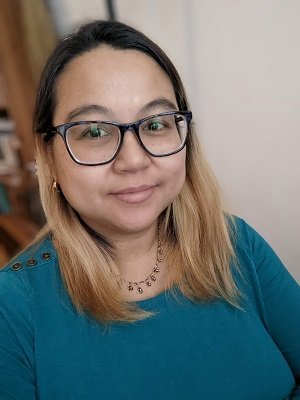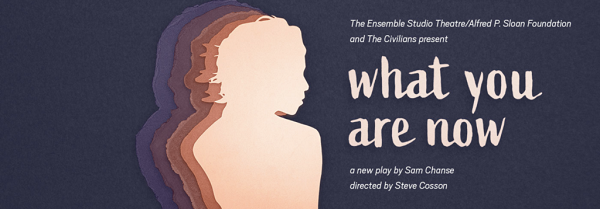On April 2, following the 2:00 PM matinee performance of what you are now, the powerful new drama by Sam Chanse, everyone is encouraged to stay for a talkback about the historical, cultural, and scientific context of the play, as well as the many issues it addresses, including how trauma gets passed from one generation to another, Cambodian American life in the U.S., and what happens in the brain when we form memories and create art. Dramaturg Soriya Chum will moderate the discussion with neuroscientist Heather Berlin, poet Pichchenda Bao, artist and activist Daveth Cheth, designer Davey Chhoeun, and chef Chinchakriya Un.
what you are now asks what if our memories aren’t fixed, but change each time we recall the past? This world premiere by Sam Chanse is a thrillingly insightful new play that asks the audience to move through the shifting dance between the past and present, and to consider how with new understanding we might change “who you were then” to “what you are now.”
what you are now is this year’s mainstage production of the EST/Sloan Project, EST’s partnership with the Alfred P. Sloan Foundation to develop new plays “exploring the worlds of science and technology,” an initiative now in its twenty-third year, and is being co-presented with The Civilians, a theater group dedicated to investigative theater, projects created through field research, community collaborations, and other methods of in-depth inquiry.
About the Panelists
Pichchenda Bao is a poet born in Cambodia at the end of the Khmer Rouge regime. She came with her parents to the United States as refugees in the 1980s, and now she lives, writes and raises her children in New York City. Her work delves into the urgencies and uncertainties of post-war and post-genocide survival and resilience, generational tension, motherhood, and feminism. Her honors include a Pushcart Prize nomination, an Emerging Writer Fellowship from Aspen Words, a grant from Queens Council on the Arts, a residency from Bethany Arts Community, and an invitation to the Kundiman writers retreat as a poetry fellow.
Dr. Heather Berlin is a neuroscientist and Associate Clinical Professor of Psychiatry and Neuroscience at the Icahn School of Medicine at Mount Sinai in NY. She explores the neural basis of impulsive and compulsive psychiatric and neurological disorders with the aim of developing novel treatments. She is also interested in the brain basis of consciousness, dynamic unconscious processes, and creativity. Berlin is a passionate science communicator and a committee member of the National Academy of Sciences and the American Association for the Advancement of Science (AAAS). She’s hosted series on PBS and the Discovery Channel and makes regular appearances on StarTalk with Neil DeGrasse Tyson, BBC, History Channel, Netflix, National Geographic, and TEDx, and was featured in the documentary film Bill Nye: Science Guy. Dr. Berlin also co-wrote and starred in the critically acclaimed off-Broadway show, Off the Top, about the neuroscience of improvisation, and the Edinburgh Fringe Festival show, Impulse Control. Berlin received her doctorate from the University of Oxford, and Master of Public Health from Harvard University, and trained in clinical neuropsychology at Weill Cornell Medicine’s Department of Neurological Surgery. She is a visiting scholar at the New York Psychoanalytic Society and Institute, and was a Visiting Professor at Vassar College, the Swiss Federal Institute of Technology/University of Zurich, and The Hebrew University of Jerusalem.
Daveth Cheth is the founder, writer, and visionary behind Khmer Identity, a platform honoring Khmer legacies and contemporary Khmer voices. Born in Cambodia, Daveth immigrated to Lynn, Massachusetts when he was nine. A queer, non-binary Cambodian artist and activist, Daveth explores the mediums of art, dance, and spoken word by focusing his work around queer visibility and Cambodian heritage and culture. A native Khmer speaker, Daveth teaches online classes in Khmer through Khmer Identity.
Davey Chhoeun is co-founder of Khmer Identify. The youngest daughter of four, and the only one born in the U.S., Davey was born and raised in Lynn, Massachusetts, where her family immigrated from Cambodia in 1988. Davey aspires to share her creative lens with her community and the world through apparel design and many personal hobbies. She graduated from Massachusetts College of Art and Design with a BFA in Fashion Design. Currently, she is a designer at a manufacturing company based in Boston. In 2020, at the beginning of the pandemic, she collaborated with Daveth Cheth to create an exhibition to share their mutual heritage with the world. This became Khmer Identity.
Chinchakriya Un is the chef and owner of Kreung Cambodia. Kreung is a project that highlights her family’s recipes and new inspired dishes that she creates. Kreung is a traveling pop up with roots in Brooklyn, NY. Chinchakriya’s goals are to raise money to buy a tractor for her family in Cambodia, create a residency for artists, connect with the Cambodian diaspora around the world, and to document her family’s stories from the past and present to include in a cookbook. She was born in a refugee camp, moved to Massachusetts and grew up in a neighborhood with other immigrant families, predominately Puerto Rican, Dominican, and Cape Verdeans, and attended a predominately white school. Chinchakriya has found that connecting with her elders and Khmer folks in the diaspora is a way that she continues to grow her understanding about the Khmer culture. She hopes that Kreung can exist as a platform for other young aspiring chefs to showcase their creations.
About the Moderator
Soriya K. Chum is a Cambodian American writer, dramaturg, and project manager working in the fields of arts and culture and book publishing. He currently produces consumer engagement events and programs for the Random House division of Penguin Random House. Previously, he has held roles at the flagship branch of The New York Public Library, Theatre for a New Audience, and the Asian American Arts Alliance. As a dramaturg, he specializes in providing support to scripted projects that focus on the lives of contemporary immigrants and refugees, particularly intergenerational stories that center the perspectives and experiences of Cambodian Americans.
what you are now began previews on March 10 and runs through April 3 at EST. You can purchase tickets here.





















